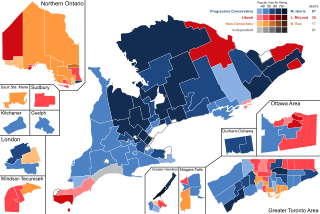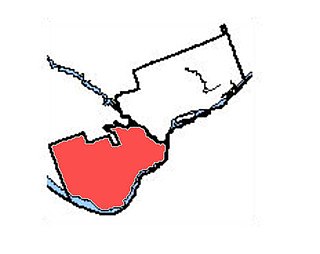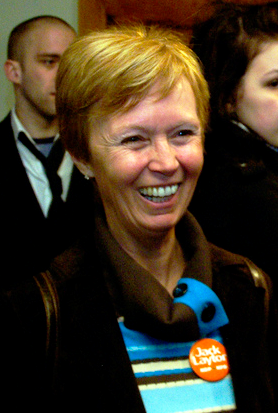Related Research Articles
The Canadian social credit movement is a political movement originally based on the Social Credit theory of Major C. H. Douglas. Its supporters were colloquially known as Socreds in English and créditistes in French. It gained popularity and its own political party in the 1930s, as a result of the Great Depression.

Alberta Social Credit was a provincial political party in Alberta, Canada, that was founded on social credit monetary policy put forward by Clifford Hugh Douglas and on conservative Christian social values. The Canadian social credit movement was largely an out-growth of Alberta Social Credit. The Social Credit Party of Canada was strongest in Alberta, before developing a base in Quebec when Réal Caouette agreed to merge his Ralliement créditiste movement into the federal party. The British Columbia Social Credit Party formed the government for many years in neighbouring British Columbia, although this was effectively a coalition of centre-right forces in the province that had no interest in social credit monetary policies.

The Christian Heritage Party of Canada, also referred to as CHP Canada, is a minor social conservative and Christian right federal political party in Canada; it was founded in 1987, the brainchild of two couples in British Columbia, namely Bill and Heather Stilwell who were Roman Catholics and Ed Vanwoudenberg and his wife, Reformed Protestants. CHP advocates for Canada to be governed according to Christian principles and ethics. The party's stated principle is that "the purpose of civil government is to ensure security, freedom, and justice for all its citizens from conception till natural death, by upholding just laws". CHP states that, if the party forms government, it hopes to "apply proven Judeo-Christian principles of justice and compassion to Canada's contemporary public policy needs".

The Social Credit Party of Canada, colloquially known as the Socreds, was a populist political party in Canada that promoted social credit theories of monetary reform. It was the federal wing of the Canadian social credit movement.
The Abolitionist Party of Canada was a Canadian political party founded by perennial candidate John Turmel. The party ran on a platform of monetary reform, including the abolition of interest rates and the income tax; the use of the local employment trading system of banking; and introducing a form of Social Credit with monthly dividends being paid out to each Canadian.
Historically in Quebec, Canada, there were a number of political parties that were part of the Canadian social credit movement. There were various parties at different times with different names at the provincial level, all broadly following the social credit philosophy; at various times they had varying degrees of affiliation with the Social Credit Party of Canada at the federal level.
The Christian Democrat Party of Canada was a Canadian political party that organized briefly in 1981-82, in an attempt to start a right-wing populist party.

John C. Turmel is a perennial candidate for election in Canada, and according to the Guinness World Records holds the records for the most elections contested and for the most elections lost, having contested 112 elections and lost 111. The other contest was a by-election that was pre-empted by a general election call.

The 1980 Canadian federal election was held on February 18, 1980, to elect members of the House of Commons of Canada of the 32nd Parliament of Canada. It was called when the minority Progressive Conservative government led by Prime Minister Joe Clark was defeated in the Commons.

The 1940 Canadian federal election was held March 26, 1940, to elect members of the House of Commons of Canada of the 19th Parliament of Canada. Prime Minister William Lyon Mackenzie King's Liberal Party was re-elected to their second consecutive majority government.

The 1995 Ontario general election was held on June 8, 1995, to elect members of the 36th Legislative Assembly of the province of Ontario, Canada. The writs for the election were dropped on April 28, 1995.
The Social Credit Party of Ontario (SCPO) was a minor political party at the provincial level in the Canadian province of Ontario from the 1940s to the early 1970s. The party never won any seats in the Legislative Assembly of Ontario. It was affiliated with the Social Credit Party of Canada and espoused social credit theories of monetary reform.
John Ross Taylor was a Canadian fascist political activist and party leader prominent in white nationalist circles.

Hull—Aylmer is a federal electoral district in Quebec, Canada, that has been represented in the House of Commons of Canada since 1917.
A number of candidates affiliated with John Turmel's Abolitionist Party of Canada contested the 1995 Ontario provincial election. The party was not registered at the provincial level, and the candidates appeared on the ballot as independents. Information about them may be found here.
John Charles Landeryou was a chef, a seniors rights activist, and a Canadian federal and long serving provincial level politician.
John H. Long is a Canadian political figure. He has sought election to the House of Commons of Canada and the Legislative Assembly of Ontario on five occasions and has run for the leadership of the Social Credit Party of Canada, the Progressive Conservative Party of Canada, and the Canadian Alliance. He is strongly influenced by social credit economic theories and has often called for reform of the Bank of Canada.

Nycole Turmel is a Canadian politician who served as the member of Parliament (MP) for Hull—Aylmer from 2011 to 2015. A member of the New Democratic Party (NDP), Turmel served as the party's interim leader from 2011 to 2012.
The Pauper Party of Ontario is a former libertarian-populist political party in the Canadian province of Ontario based on the principles of social credit. Registered in 2011, the party was led by perennial candidate John Turmel.
References
The biggest loser: John Turmel is making his 99th try for office this fall